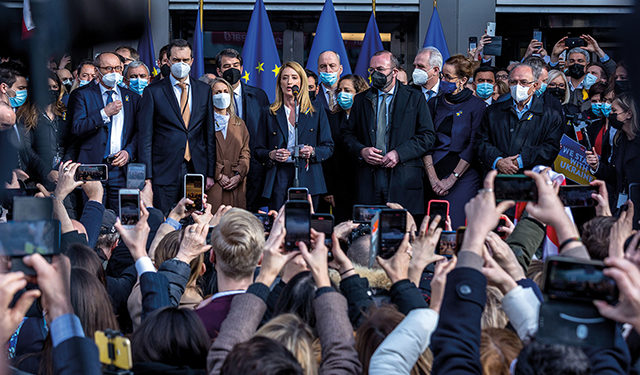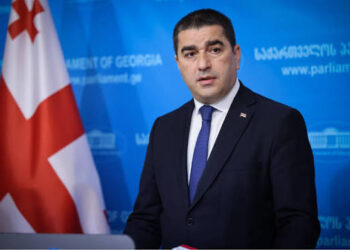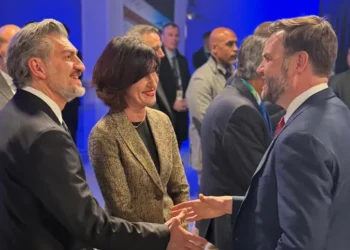Volodymyr Zelensky addressed the Russian people the day before Russia invaded Ukraine last week, asking them to stop their leadership from sending troops across the border and into his country, in an emotional video appeal that underscored the close ties between the two nations.
Zelensky said Moscow had approved the movement of nearly 200,000 troops into Ukrainian territory, along with thousands of armored vehicles. He said an incursion risked becoming “the start of a big war on the European continent.”
“You are being told this is a plan to free the people of Ukraine,” Zelensky said. “But the Ukrainian people are free.”
“The Ukraine on your news and Ukraine in real life are two completely different countries, and the main difference is that ours is real,” Zelensky said. “You are told that we are Nazis. How could a people that lost more than 8 million people in the fight against Nazism support Nazism?
“How could I be a Nazi?” Zelensky, who is Jewish, asked, noting that his grandfather spent the entire war as a Soviet soldier but died in an independent Ukraine.
Zelensky said Russian citizens are being told that he is preparing an offensive to retake separatist territory in the Donbas region and “bomb it without question.” But, he asked, who would he be attacking?
“Luhansk? The house where my best friend’s mother lives? The place where my best friend’s father is buried?” Zelensky said.
“This is our land. This is our history. What are you fighting for and with whom?” he asked. “Many of you have been to Ukraine. Many of you have relatives in Ukraine. Some have studied in Ukrainian universities. Some have made friends with Ukrainians. You know our character. You know our people. You know our principles.”
“The people of Ukraine want peace,” he said. “The government of Ukraine wants peace.”
He then warned Russians that if their military invaded Ukraine, his nation would defend itself.
“We know for sure we do not need a war, not a cold one, not a hot one, not a hybrid one,” he said. “But if these forces attack us, if you attempt to take away our country, our freedom, our lives, the lives of our children, we will defend ourselves. Not attack: defend. And in attacking, you are going to see our faces. Not our backs: our faces.”
His message fell on deaf ears, and the following morning, Russian troops crossed into Ukrainian territory and the Ukrainians began fighting back.
Hitting Back
Europe is at a “watershed moment”, European Commission President Ursula von der Leyen told a press conference following a meeting with NATO Secretary General Jens Stoltenberg in Brussels.
Stressing the unity between the EU and NATO, she said: “It is our shared duty to stand up to the gravest act of aggression on European soil in decades,” and added: “What is at stake is not just Donbas, not just Ukraine, but the whole international order.”
Outlining “massive and targeted sanctions” that will be brought in by the European Union, von der Leyen said: “This package will include financial sanctions that harshly limit Russia’s access to the capital markets” and “cut off Russia’s industry from the technologies desperately needed today to build a future.”
She highlighted said financial sanctions would “suppress Russia’s economic growth, increase borrowing costs, raise inflation, intensify capital outflow and gradually erode its industrial basis.
The second main pillar of sanctions are set to limit Russia’s access to crucial technology.
“Our measures will weaken Russia’s technological position in key areas from which the elite makes most of their money – this ranges from high-tech components to cutting-edge software.”
“This will seriously degrade the Russian economy in all areas in the future,” the European Commission President added.
This week, Russian banks were cut off from SWIFT, the EU and the US locked the sky to Russian traffic, restrictions were imposed on the central bank, transactions were frozen, and media outlets spreading Russian propaganda were sanctioned. Apple, ExxonMobil, Ford, Boeing and Airbus joined a long list of companies shutting down or suspending their operations in Russia in response to its invasion of Ukraine and the ensuing Western sanctions. The Ruble weakened again to trade at 112 to the US dollar.
Kremlin spokesman Dmitry Peskov agreed Russia’s economy is being hit hard by the international moves against Russian finances.
“Russia’s economy is suffering serious blows. But there is a certain margin of security, there is potential, there are certain plans. Work is underway. [The economy] still stands,” Peskov said this week.
Support from the UK
Boris Johnson, Prime Minister of the UK, has maintained a very strong position against Russia this week.
“Our mission is clear, diplomatically, politically, economically, and eventually, militarily: this hideous and barbaric venture of Vladimir Putin must end in failure,” Johnson said, noting that Ukraine is a country that for decades has enjoyed freedom and democracy and the right to choose its own destiny. “We, and the world, cannot allow that freedom just to be snuffed out. We cannot and will not just look away,” noted Johnson.
The Weapons Supply
The EU earmarked €450 million ($503 million) for lethal arms over the weekend, which include air-defense systems, anti-tank weapons, ammunition, and other military equipment for Ukraine’s armed forces. A further €50 million will be spent on providing non-lethal supplies such as fuel, protective gear, helmets, and first-aid kits- DW reported.
“The US is also stepping up its shipments and providing an additional $350 million in military assistance, including Javelin antitank missiles, Stinger anti-aircraft missiles, small arms and ammunition, bringing the total of US military aid to Ukraine to $1 billion over the past year and to more than $2.5 billion since 2014”- DW added.
China Keeping a Distance
China has attempted to distance itself from Russia as the scale of the invasion becomes clear, with Foreign Minister Wang Yi on Friday saying it was “absolutely imperative” for all sides to exercise restraint to prevent the conflict from “getting out of control,” Bloomberg journalists wrote.
“China has been following the evolution of the Ukraine issue, and the present situation is something China does not want to see,” Wang Yi said in phone calls with top diplomats from the UK, France and the European Union, according to a readout from the official Xinhua News Agency.
“The safety of ordinary people’s lives and properties should be effectively safeguarded, and in particular, large-scale humanitarian crises have to be prevented,” the report cited him as saying.
“The comments came shortly after President Xi Jinping made his first remarks on the crisis, urging Russian leader Vladimir Putin in a phone call to solve the issue through talks with the Ukrainians.”
Ukraine- an EU Member Candidate
The issue of Ukraine’s membership of the EU has been pushed hard by the country’s president following the outbreak of war.
European Commission President Ursula von der Leyen said in an interview with Euronews that Ukraine is “one of them” and they want Ukraine to be in the EU.
“There are many issues where we (the EU and Ukraine) work very closely and, indeed, over time, they are becoming part of us. Ukraine is one of us and we want it to be in the EU,” she said.
The European Parliament adopted a resolution on Tuesday calling on the European Union institutions “to work towards granting” Ukraine the status of EU candidate country, it said in a statement quoted by CNN’s Niamh Kennedy and James Frater.
“The resolution, which also demanded the EU to impose ‘tougher sanctions’ on Russia, was voted in favor by 637 Members of the European Parliament (MEPs). It condemned ‘in the strongest possible terms Russia’s illegal invasion of Ukraine and demands that the Kremlin end all military activities in the country,’ CNN reported. “The members also stressed that the EU’s financial sanctions against Russia should go further, stating that ‘all Russian banks should be blocked from the European financial system and Russia should be banned from the SWIFT system.’
“While welcoming the swift adoption of EU sanctions, MEPs want to see broader restrictive measures aimed at strategically weakening the Russian economy and industrial base. In particular, imports of the most important Russian export goods, such as oil and gas should be restricted. New EU investment in Russia and new Russian investment in the EU should be banned,” the press release said.
Further, the United Nations has voted overwhelmingly for a resolution deploring Russia’s invasion of Ukraine and has called for the immediate withdrawal of its forces.
In an emergency session of the UN’s general assembly, 141 of the 193 member states voted for the resolution, 35 abstained, and five voted against. The only countries to vote no in support of Moscow were Belarus, North Korea, Eritrea and Syria.
Longstanding allies Cuba and Venezuela joined China in abstaining. The resolution said the UN “deplores in the strongest terms the aggression by the Russian Federation against Ukraine.” It demanded that “the Russian Federation immediately cease its use of force against Ukraine” and “immediately, completely and unconditionally withdraw all of its military forces.”
The resolution is not legally binding but is an expression of the views of the UN membership, aimed at increasing pressure on Moscow and its ally, Belarus.
By Ketevan Skhirtladze














